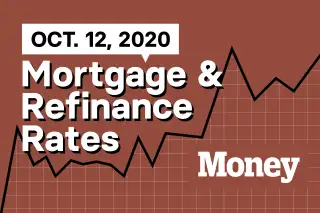Here Are Today's Best Mortgage & Refinance Rates for October 12, 2020

The average rate for a 30-year fixed-rate purchase mortgage was 3.534% on Friday. The average rate for a 30-year refinance was 4.375%.
Money's current mortgage rates include data from over 8,000 lenders across the United States and are updated daily. The rates include points and represent what a borrower with a 20% down payment and 700 credit scores — roughly the national average FICO score — would have been quoted.
| 30-year fixed-rate purchase mortgage |
| 3.534% |
| Rate of October 9, 2020 |
Mortgage rates vary from state to state. On Friday, borrowers in Ohio were quoted the lowest mortgage rates — at 3.358%. People looking for mortgages in Nevada saw the highest average rate at 3.78%. Nationwide, borrowers with the highest credit scores, 740 and above, were quoted rates averaging 3.05%, while those with credit of 640 or below were shown rates of 4.748% — a 1.698 percentage-point spread.
You may be able to negotiate a lower rate if you shop around or if you have other accounts with the lender. (Money's picks for the best mortgage lenders are here.) Currently, some banks are hiking up advertised rates to keep demand in check, so you may be offered a lower rate if you reach out directly.
Freddie Mac's widely quoted Primary Mortgage Market Survey put rates at 2.87% with 0.8 points paid for the week ending October 8. The mortgage purchaser's weekly survey reflects borrowers who put 20% down on conforming loans and have excellent credit.
Refinance rates today
Money's survey also shows that the offered rate for a 30-year refinance for someone with a 740 credit score was 3.712% on Friday. Last October, the average mortgage rate (including fees) was 3.859%.
| 30-year fixed-rate mortgage refi |
| 3.712% |
| Rate of October 9, 2020 |
A homeowner with a $200,000 mortgage balance currently paying 3.859% on a 30-year loan could potentially cut their monthly payment from $939 to $922 by financing at the current lower rates. To determine if it's worth it to refinance your mortgage, also consider the closing fees you paid on your current mortgage, how much your new lender is charging and how long you have left on your loan term. (Our picks for the best lenders for refinancing are here).
What else is happening in the housing market right now?
The wildfires ravaging areas of California and Oregon over the last few weeks are having a serious impact on the housing market in those states, according to data from Realtor.com.
There are currently over 12,500 homes at risk in both states with a total estimated value of $12.5 billion. In California alone the fires have consumed 4 million acres, eclipsing the previous high of approximately 1.8 million acres. Over 12,000 homes in the state are considered at risk — either already evacuated, under orders to evacuate, or with an evacuation warning — with an estimated value of $9.4 billion. In Oregon, there are currently more than 400 homes at risk with an estimated value of $85.8 million.
"Looking forward, the long term impact on real estate markets will depend on whether people decide to stay and rebuild or move somewhere else," said Danielle Hale, Realtor.com's chief economist. "Real estate markets do well when people want to live in an area. With fire risks front and center, the desirability of living in California could take a hit. With all that in mind, this isn't California's first wildfire, and it won't be its last. Californians are resilient and they'll likely find new ways to manage future fires and risks. We don't expect to see a huge migration out of the area or for home prices to drop dramatically."
Mortgage Term of the Week
Understanding the lingo can be key to avoiding mistakes when you are buying a home or refinancing your mortgage. For more read: Everything You Need to Know About Mortgage Rates in 2020
Cash to close: Cash that a buyer has easily available to pay the closing costs associated with a mortgage loan. Closing costs typically range from 2% to 7% of the home's price and can include appraisal, inspection and title fees, property taxes and mortgage points. Currently, however, some lenders are waiving appraisal requirements.
Bottom line:
Get to Know the 'Leaseback,' the Pandemic House Selling Trend Where no Move Is Required
In the Competitive Coronavirus Housing Market, This Loophole Is Making It Easier to Buy a House
Buying Mortgage Points Can Lower Your House Payments. But What the Heck Are They?